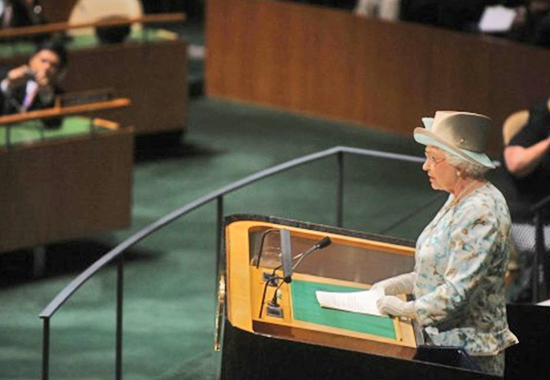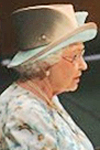|

QUEEN ELIZABETH II SPEAKS BEFORE THE
UN GENERAL ASSEMBLY - 2010
Address to the U.N. General Assembly
It follows the full text transcript of
Elizabeth II's Address to the General Assembly
of the United Nations, delivered at New York, N.Y. —
July 6, 2010.

 |
Mr. President,
Secretary-General,
Members of the
General Assembly, |
I believe I was
last here in 1957.
Since then, I have travelled widely and met many
leaders, ambassadors and statesmen from around
the world. I address you today as Queen of
sixteen United Nations Member States and as Head
of the Commonwealth of 54 countries.
I have also witnessed great change, much of it
for the better, particularly in science and
technology, and in social attitudes. Remarkably,
many of these sweeping advances have come about
not because of governments, committee
resolutions, or central directives — although
all these have played a part — but instead
because millions of people around the world have
wanted them.
For the United Nations, these subtle yet
significant changes in people's approach to
leadership and power might have foreshadowed
failure and demise. Instead, the United Nations
has grown and prospered by responding and
adapting to these shifts.
But also, many important things have not
changed. The aims and values which inspired the
United Nations Charter endure: to promote
international peace, security and justice; to
relieve and remove the blight of hunger, poverty
and disease; and to protect the rights and
liberties of every citizen.
The achievements of the United Nations are
remarkable. When I was first here, there were
just three United Nations operations overseas.
Now over 120,000 men and women are deployed in
26 missions across the world. You have helped to
reduce conflict, you have offered humanitarian
assistance to millions of people affected by
natural disasters and other emergencies, and you
have been deeply committed to tackling the
effects of poverty in many parts of the world.
But so much remains to be done. Former
Secretary-General Dag Hammarskjold once said
that
"constant
attention by a good nurse may be just as
important as a major operation by a
surgeon."
Good nurses get better with practice. Sadly the
supply of patients never ceases.
This September, leaders will meet to agree how
to achieve the Millennium Development Goals when
each nation will have its own distinctive
contribution to make. New challenges have also
emerged which have tested this organization as
much as its member states. One such is the
struggle against terrorism. Another challenge is
climate change, where careful account must be
taken of the risks facing smaller, more
vulnerable nations, many of them from the
Commonwealth.
Mr. President, I started by talking about
leadership. I have much admiration for those who
have the talent to lead, particularly in public
service and in diplomatic life — and I
congratulate you, your colleagues and your
predecessors on your many achievements.
It has perhaps always been the case that the
waging of peace is the hardest form of
leadership of all. I know of no single formula
for success, but over the years I have observed
that some attributes of leadership are
universal, and are often about finding ways of
encouraging people to combine their efforts,
their talents, their insights, their enthusiasm
and their inspiration, to work together.
Since I addressed you last, the Commonwealth,
too, has grown vigorously to become a group of
nations representing nearly two billion people.
It gives its whole-hearted support to the
significant contributions to the peace and
stability of the world made by the United
Nations and its agencies. Last November, when I
opened the Commonwealth Heads of Government
Meeting in Trinidad and Tobago, I told the
delegates that the Commonwealth had the
opportunity to lead. Today I offer you the same
message.
For over six decades the United Nations has
helped to shape the international response to
global dangers. The challenge now is to continue
to show this clear and convening leadership
while not losing sight of your ongoing work to
secure the security, prosperity and dignity of
our fellow human beings.
When people in fifty-three years from now look
back on us, they will doubtless view many of our
practices as old-fashioned. But it is my hope
that, when judged by future generations, our
sincerity, our willingness to take a lead, and
our determination to do the right thing, will
stand the test of time.
In my lifetime, the United Nations has moved
from being a high-minded aspiration to being a
real force for common good. That of itself has
been a signal achievement. But we are not
gathered here to reminisce. In tomorrow's world,
we must all work together as hard as ever if we
are truly to be United Nations.

More History
|
|